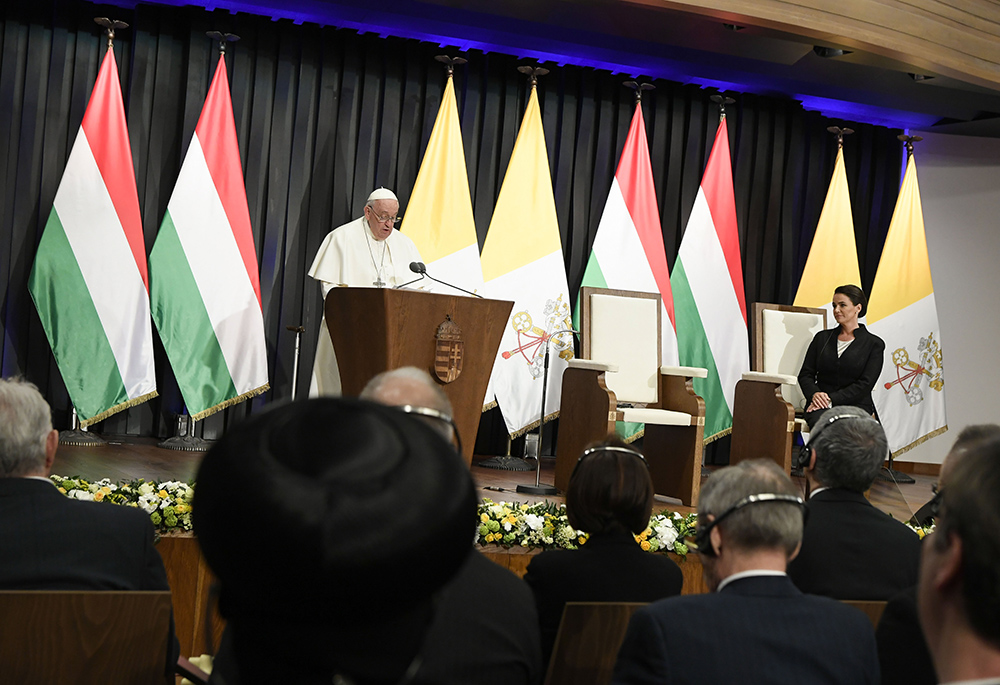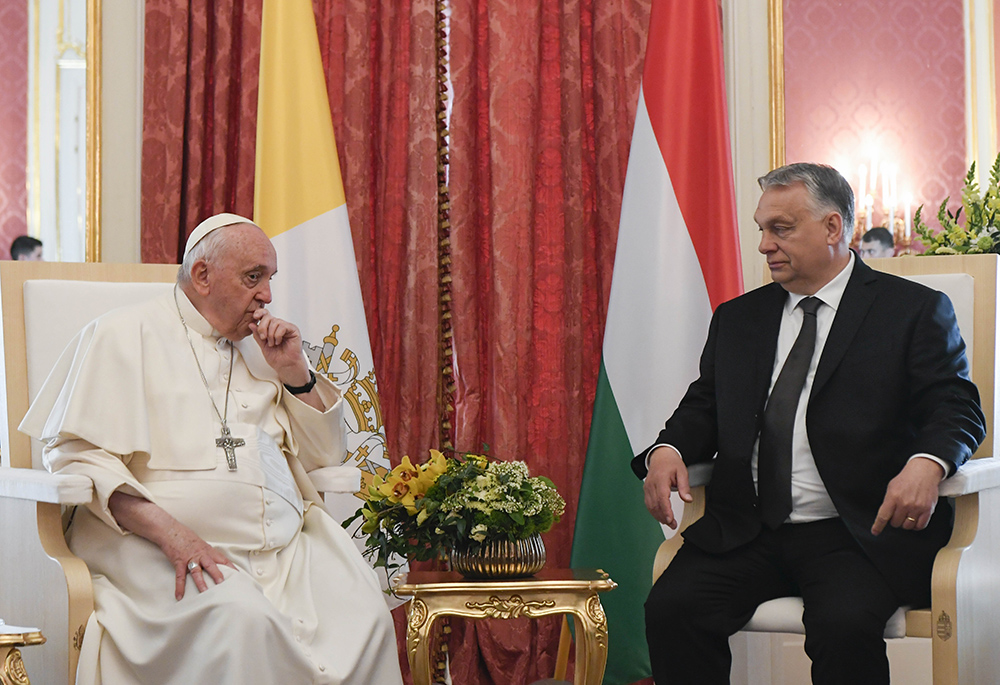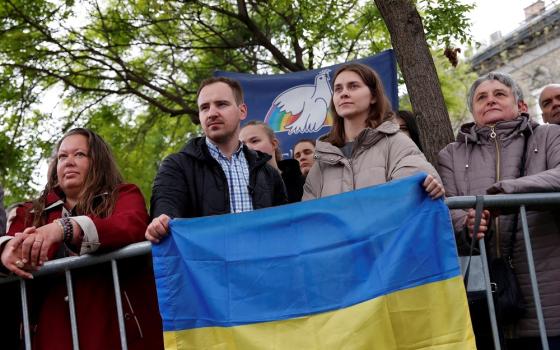Pope Francis attends a welcoming ceremony with Hungarian President Katalin Novák at Sándor Palace in Budapest, Hungary, April 28, 2023. (CNS photo/Vatican Media)
Pope Francis on April 28 launched his closely watched three-day trip to Hungary by telling the country's staunchly anti-immigrant political leaders that if the country wants to remain true to its Christian roots, it must be willing to accept migrants and refugees.
" 'I urge you to show favor not only to relations and kin, or to the powerful and wealthy, or to your neighbors and fellow-countrymen, but also to foreigners and all who come to you,' " said Francis, quoting St. Stephen, the country's 10th century king who spread Christianity throughout Hungary.
In the presence of Hungarian Prime Minister Viktor Orbán — one of Europe's most polarizing leaders who has previously lambasted migration as a "Trojan wooden horse of terrorism," while styling himself as a defender of traditional Christianity — the pope recalled the country's heritage of Christian leaders whose lives have been marked by openness towards others and a "gentleness" of spirit.
Francis' appeal offered a stark contrast to Orbán, who over the last decade has seized on migration as a wedge issue, often using coarse language characterizing migrants as "invaders" who threaten the country's national identity.
The pope, drawing on Hungary's own past, offered a different perspective.
" 'I urge you to welcome strangers with benevolence and to hold them in esteem, so that they prefer to be with you rather than elsewhere,' " Francis said, again quoting St. Stephen.

Pope Francis gives his first speech in Hungary to government and civic leaders and diplomats serving in Budapest at the former Carmelite monastery that now houses the office of Prime Minister Viktor Orbán, on April 28. (CNS/Vatican Media)
While acknowledging that welcoming new arrivals can be a "complex" issue, the pope said that "for those who are Christians, our basic attitude cannot differ from that which St. Stephen … having learned it from Jesus, who identified himself with the stranger needing to be welcomed."
The pope's remarks come after a year in which some 2 million refugees fleeing the war in neighboring Ukraine have passed through Hungary, prompting the government to at least temporarily soften its stance and pledge to support new arrivals. At the same time, Orban has been criticized for applying a double standard by providing aid to Ukrainians, while denying it to non-Europeans refugees.
Against the backdrop of war, the pope delivered an impassioned appeal for united Europe in a country that earlier this year hinted that it might seek to leave the European Union.
Francis, urging a return to multilateralism, went on to cite from the founding fathers of the European Union who after the Second World War sought to forge together in hopes of preventing future conflicts.
"We seem to be witnessing the sorry sunset of that choral dream of peace, as the soloists of war now take over," he lamented.
Now is the time, said the pope, "to recover the European spirit: the excitement and vision of its founders, who were statesmen able to look beyond their own times, beyond national boundaries and immediate needs, and to generate forms of diplomacy capable of pursuing unity, not aggravating divisions."
While only directly mentioning the conflict in Ukraine once, the pope quoted from the 1950 Schuman Declaration that inspired today's 27-member European Union: "World peace cannot be ensured except by creative efforts, proportionate to the dangers threatening it."
"At the present time," Francis added, "those dangers are many indeed; but I ask myself, thinking not least of war-torn Ukraine, where are creative efforts for peace?"
Advertisement
In her opening remarks to the pope, Hungarian President Katalin Novák praised the pope for coming to Hungary, saying, "Hungarians and millions of people all over the world see in you the man of peace!"
"Speak to Kyiv and Moscow, to Washington, Brussels, Budapest and with all those without whom there can be no peace," she pleaded. "Here, in Budapest, we ask you to kindly personally intercede for a just peace as soon as possible."
In recent months, Orbán's government has been widely viewed as inching closer to Russia and China than to Europe, with the prime minister claiming that Hungary and the Vatican are the only two countries in Europe seeking peace.
Ahead of the pope's arrival here in Budapest, many western and European diplomats to the Vatican had expressed concern that Francis' presence in Hungary could be instrumentalized by Russia and its allies.
In Rome, in recent days, numerous ambassadors stressed that while the pope's peace message is welcomed, they insisted that he must offer an unqualified call for a "just peace" that properly identifies the aggressor and the victim.
Yet while the majority of the pope's 20-minute address offered a markedly different vision for Europe than that of the current Hungarian government, Francis commended the country's pro-family policies that seek to promote traditional marriage and limit legal abortion.
"How much better it would be to build a Europe centered on the human person and on its peoples, with effective policies for natality and the family — policies that are pursued attentively in this country — a Europe whose different nations would form a single family that protects the growth and uniqueness of each of its members," said the pope.
As the pope concluded his opening remarks in Hungary — his second visit in less than two years — Francis again praised the country's strong national identity, but said it must also be marked by an "openness towards others."

Pope Francis meets with Hungarian Prime Minister Viktor Orbán at Sándor Palace April 28 in Budapest, Hungary. The pope was beginning a three-day trip to Hungary's capital with meetings with government officials. (CNS/Vatican Media)
The pope delivered his remarks here at a former Carmelite monastery, which today serves as the seat of Hungary's head of government, following private meetings with both Novák and Orbán.
During the short two-hour flight from Rome, Francis spent some 25 minutes greeting reporters traveling with him. When asked how he was feeling, the 86-year-old pontiff who was hospitalized with bronchitis for three days last month, joked that "weeds never die."
Upon arriving in Hungary, Francis — who has struggled with mobility issues over the last year and has relied on the use of a wheelchair during his recent travels — forewent the chair, both walking on the tarmac using only the assistance of a cane and delivering his speech while standing.
After dedicating the majority of his inaugural remarks to the theme of migration, Francis will begin his second-day in the Hungarian capital by meeting with refugees, including recent arrivals from Ukraine.





